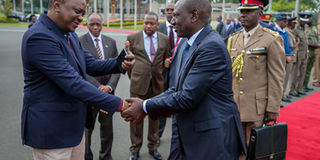Uhuru cannot fight Ruto and then claim to have only four legacy issues

President Uhuru Kenyatta and DP William Ruto at JKIA on March 29, 2018 shortly before the President left for Mozambique. PHOTO | FILE | PSCU
What you need to know:
- Mr Ruto is an increasingly ambitious, tenacious and scheming politician who has tested power as a deputy who was at one time treated as a co-president.
- The President may have postponed a Jubilee Parliamentary Group meeting for fear of a showdown between his and his deputy’s supporters, but that does not solve the crisis.
- There is a crisis when the President cannot address a party organ because he reckons that the meeting will deviate from the four issues.
President Uhuru Kenyatta made his bed and must lie in it. He cannot start an unseemly campaign against Deputy President William Ruto, even with the soiled assistance of Mr Raila Odinga, hitherto a veteran of the opposition barricades, and not expect a fightback.
For one thing, Mr Ruto is the constitutional heir apparent; constitutionally Kenya's most powerful Number Two; the President's 2010 International Criminal Court (ICC) co-accused; and a mobiliser of critical Rift Valley support for the governing Jubilee Party now and in 2012 when the President’s The National Alliance (TNA) and Mr Ruto’s United Republican Party (URP) joined to win the 2013 General Election.
For another, Mr Ruto is an increasingly ambitious, tenacious and scheming politician who has tested power as a deputy who was at one time treated as a co-president and who, for five years, was comfortable he was a heartbeat away from the most powerful office in the land.
To get it he already has a countrywide network of pointmen all primed to campaign for him to succeed President Kenyatta and invests millions in frequent fundraisers for assorted public causes across the land.
PRE-ELECTION PACT
Over and above all this, Mr Ruto and the Rift Valley bedrock of Jubilee and especially the Kalenjin pillar of it, expect the President to honour a 2012 pre-election pact by which the President would, on completion of two five-year terms, support Mr Ruto’s bid for the presidency.
President Kenyatta cannot, then, turn against and begin to belittle Mr Ruto publicly and expect that his allies will not hit back and, therefore, cause friction in Jubilee and the government that it runs.
The President may have postponed a Jubilee Parliamentary Group meeting for fear of a showdown between his and his deputy’s supporters, but that does not solve the crisis.
Yes, it is a crisis. A crisis is an occasion when an important or difficult decision must be made. A crisis is a time of acute difficulty or danger. To argue, as do Jubilee Secretary-General Raphael Tuju and Vice-Chairman David Murathe, that there is no crisis in the land, is as futile as burying one’s head in the sand at one’s feet to escape the swirling sandstorm in the air borne of a punctured Presidency.
CRISIS
There is a crisis when the President cannot address a party organ because he reckons that the meeting will deviate from the four issues he feels will form his legacy namely housing, health, manufacturing and jobs and, instead, dwell on the politics of his succession especially if he precipitated the succession rumpus himself.
To call the widening divisions in Jubilee and government and the rising decibels of claim and counterclaim caused by the President’s public war against Mr Ruto and the enlistment of Mr Odinga in the prosecution of the onslaught a storm in a teacup, as does Mr Tuju, is, once again, to bury one’s head in the sand but expose the rest of one's body to the coming storm.
Whatever party platform President Kenyatta will turn to to address whatever issue, he must be prepared to be confronted with the fact that he unilaterally declared war on Mr Ruto and that he unilaterally invited Mr Odinga into government for the singular purpose of derailing his deputy’s perfectly legitimate ambition to succeed him.
POLITICS
In so doing the President not only precipitated a crisis of politics and governance but also ensured that his succession will not only dominate his last term, but will also be the most important issue of his presidency and, therefore, legacy.
No Kenyan President has fought his Number Two so publicly and sordidly. No Kenyan President has made peace with his main and fiercest opposition rival in order to tame his Number Two’s determination to succeed him.
With Mr Odinga ensconced in the personal Canaan of government, travelling the world like an elected VIP only second to the President; with his Orange Democratic Movement now an accessory of Jubilee; and with TNA and URP long dissolved to strengthen the President’s political hand, it is not surprising that opposition to the President is resident in Jubilee.
President Kenyatta cannot fight his deputy and then argue that the only issue the governing party should discuss is his Big Four legacy.
Undermining Mr Ruto is part and parcel of his legacy. Indeed the Big Four legacy may prove a pipe dream, but fighting Mr Ruto is live and real with real, immediate and live consequences.





